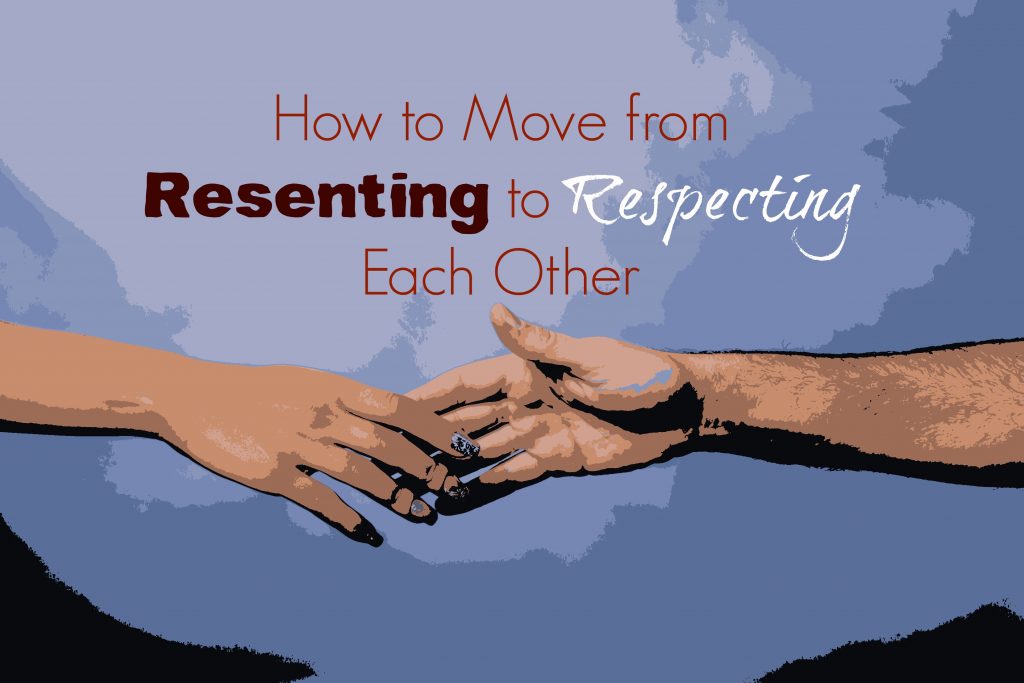Podcast: Play in new window | Download
Subscribe: RSS
Did you go into marriage vowing to resent each other as long as you both shall live? I didn’t think so. Like most couples, you vowed to love, honor, and respect each other. You started on a path of mutual love and respect then at some point you lost your way. The Big 3: work, kids, and managing a household, sucked up a lot of your time and energy, leaving little for yourself or each other. Conversations were mostly task-oriented. You fought more than you fondled each other. I think you get the picture. Now you’re in a bad place. Respect has morphed into resentment. Resentment is a defense mechanism. It serves as a shield against future harm. A spouse can use it to create space and avoid being hurt again. Lingering resentment will suffocate your marriage. So, how can you move from resenting to respecting each other? You can do this together by making these six agreements. [Tweet ” Lingering resentment will suffocate your marriage.”]Agree to look honestly at how resentment is ruining your relationship
As I indicated, resentment functions as a protector. It shields you from future harm. The downside of this strategy is that it prevents the opportunity for close connection. You miss out on intimacy. Ignored resentment is a predictor of an unhappy marriage.Agree to own your resentment
Marital discord is less about the recent argument and more about the resentful pattern. Rather than locking horns on the latest dispute maybe it’s time to talk about the resentment that sits between you. Own your resentment. “I purposely push you away with my resentment.” Ask your spouse if they are open to listen and understand your resentment. If he/she is, then share it in a tone of respect. It will be easier to listen if your tone is respectful. Behind anger or resentment is hurt. Convey your hurt. It might be helpful to write it in the form of a letter you can read. Here is an example: “I am hurt by what you did (or didn’t do) in our relationship. Resenting you became easier than feeling the hurt of rejection.” I understand it is a risk to be vulnerable. You do not want to be hurt again. The next step is for your partner.Agree to listen and understand your partner’s resentment
This will take a level of courage on your part that matches that shown by your spouse when she/he owned their resentment. This is not a time to cross your arms and be defensive. You will kill a moment and destroy your marriage if you defend or blame. Be open and listen with fresh ears. Show some empathy, look your mate in the eye and convey that you care about their feelings. Validate your spouse’s experience. “What I hear you saying is…” “I know this was not easy for you to share…” “I respect you for the courage to be honest with me…”Agree to own and repair the offense
In previous blogs I introduced the concept of the Repair Kit. Without going into detail, here are the 5 steps.- Admit your offenses.
- Acknowledge how your actions specifically hurt your spouse.
- Accept responsibility for your behavior without blame.
- Ask for forgiveness.
- Agree that you will work on changing the pattern of behavior causing hurt and resentment.
Agree to start letting go of resentment
Letting go of resentment begins by accepting your partner’s actions as a sincere attempt to repair. Mutually agree to consciously work on letting go. Be patient with the process and each other. Letting go takes time, but you must start working at it right away. You will also have to face your fear of future hurt. If you want intimacy in the marriage you must confront your fear.Agree to work on mutual respect
Moving from resenting to respecting each other requires a different tone of interaction. Start by being considerate in little ways toward each other. Small acts of courtesy or kindness goes a long way. Baby steps become bigger ones soon. Finally, acknowledge the effort of your spouse with a “Thank you for…”Now it’s your turn
Are you tired by the weight of resentment you carry? Perhaps today is the start of losing it. Here are some next steps to consider.- Ask your spouse to read this blog and/or listen to the podcast (link above).
- Follow up with a conversation to see if he/she wants to work on the 6 agreements.
- If the two of you don’t think you can do it together consider a couples counselor to assist.
- Read my book, Bringing Respect Back: Communicating Without the Conflict

